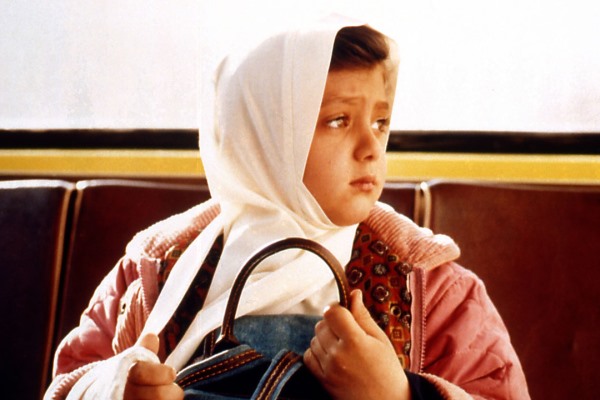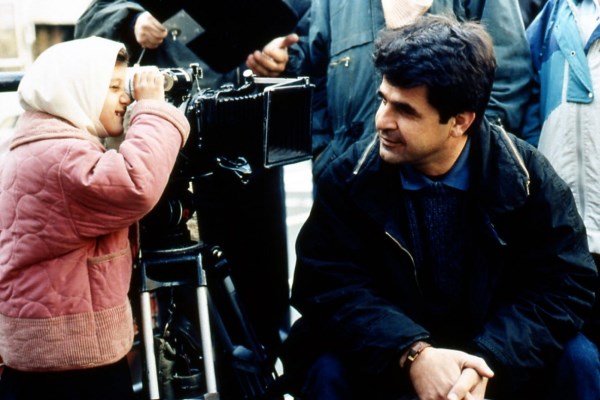A little girl is waiting for her mother on a busy sidewalk in Tehran. All other first graders have already been picked up by their parents, while she, a girl with her arm in a sling, is still alone. Her quilted pink jacket hangs open; her blue school satchel is dragging on the ground. She peers at the people passing by, attempts to make a phone call and then decides that she’s going home on her own. A school mistress’s friend offers to give her a lift on his bike, but she hops off midway thinking that she has spotted her mother on the bus.

And so starts Mina’s adventure in Jafar Panahi’s film The Mirror. She gets on the wrong bus. She hears people’s stories. She’s worried about not being able to find her mom. And then suddenly, she stares straight into the camera, rips off her arm cast, her pink coat and her white headscarf and announces that she doesn’t want to play anymore. The camera swivels to show the bus full of shocked and confused film crew, with Panahi himself burying his head in his hands. We’re as shocked as they are. What’s going on?
What comes next is even more surprising. The actress Mina Mohammadkhani no longer wants to act. Mirroring the film plot, she refuses to be taken home and announces that she will find her own way. She still has her microphone, which is why Panahi’s camera can follow her through the traffic of Tehran. The camera becomes our eyes. It’s as anxious as we are not to lose Mina in the chaotic city. We see her walking down the streets of Tehran, a little girl on a mission to get home on her own.
Mina may be only eight or nine, but she’s a tough cookie. The reason she gets fed up with playing her part is because she doesn’t want to appear weak and helpless. She haggles with the taxi drivers—“when I went with my mother it was 20 touman”, refuses offers to take her home from kind strangers—“I know where to go, just tell me in which direction is the Victory Avenue,” waits for her brother for 5 seconds flat before she decides that it’s too long and she might as well go home on her own. The film is animated by her outsized personality.

Panahi, one of the most renowned directors in Iranian cinema, is a master of breaking the fourth wall. This conventionally invisible, imagined screen separates the viewers from the actors. The actors pretend it doesn’t exist. The audience pretends it can see through it. Yet, the boundary is less precise than assumed, either in cinema or in life.
Panahi’s genius is to turn conventions on their head. His films often raise political topics and have such a strong viewpoint that Panahi has been arrested on several occasions and in 2010 was sentenced to house arrest and a 20-year ban on making films. The sentence hasn’t prevented him from working. He uses untrained actors and relies on their sense of the situation to develop the plot (Crimson Gold, 2003), weaves snippets of real conversations into his films (Taxi, 2015), and shoots with smartphones and handheld cameras (This is Not a Film, 2011).
An important star of Panahi’s films is Tehran and its daily life. Tehran is a congested, polluted, crowded city, and it can be difficult to love. Mina’s adventures in Ayaneh on Tehrani public transportation eerily mirrored my own, including getting lost, crossing the street with four lanes of nonstop traffic and haggling with taxi drivers. Like Mina, I found most people helpful and kind—a shopkeeper went out of his way to take me to the proper bus stop, someone else made sure I paid the correct fee for the shared taxi. Panahi breaks the fourth wall in his film—as in many others—and suddenly I feel like I’m in the city. I can smell the fumes of exhaust, bread shops, sellers of boiled beets and sugary snacks, the dry rustle of fallen plantain leaves, and the uneven heat of the late autumn sun.
The camera in Panahi’s hands becomes the mirror, ayaneh in Persian. It reflects the life around us and ourselves with our thoughts, dreams, anxieties. What is the real world and what is the imagined one? What about the people we encounter? Are they genuine or are they pretenders? As we look in the mirror Panahi holds up to us, we wonder where the fantasy starts and where it ends and whether it even matters what’s real and what is not. We often wait for some big bang to break up the routine, but it’s the random and the seemingly insignificant that leaves the most lasting traces. One might as well hold up a mirror to it.
Jafar Panahi, The Ayaneh (Mirror), 1997.
















41 Comments
Anne: I saw a documentary on Iranian cinema and it mentioned Panahi. I saw only one film by him White Balloon and it was really touching. I need to watch more. October 1, 2018 at 9:37am
Victoria: It’s a beautiful film. October 2, 2018 at 5:24am
Caitlenn: Excellent share … our world needs many more ppl like you & Panahi … ones with the grace & courage to put the ayaneh [mirror] squarely in our faces … to hopefully activate humanity’s empathy … lead us to be more compassionate and effective neighbors on this precious Earth of ours. Well done. Is first I’ve ever heard abt Panahi’s work. I’ll be watching for all his efforts now. October 4, 2018 at 1:15pm
Victoria: I hope that you’ll enjoy it and that it will inspire you to watch other films by Panahi. October 5, 2018 at 5:57am
Jeremy: Great post! I found that you can watch it on YouTube with English subtitles. October 1, 2018 at 10:07am
Matty: Thank you for the You Tube info. October 1, 2018 at 10:18am
Jeremy: I wouldn’t have mentioned it, because I’m ambivalent about YouTube, but I couldn’t find this film on Amazon or online stores. It seems like a film worth watching if only to support Panahi. October 1, 2018 at 10:27am
Victoria: Yes, they’re hard to find in stores, at least in Europe. I used to watch them on Netflix, when I lived in the US. The last time I saw Panahi’s films was during a film week in Brussels dedicated to his work. October 2, 2018 at 5:29am
Sandra: Thank you! I will look it up too October 1, 2018 at 10:33am
Victoria: Another film I should mention is Offside. Excellent and moving. October 2, 2018 at 5:29am
maja: I loved Offside! 🙂 October 2, 2018 at 8:51am
Victoria: It’s great, isn’t it? October 2, 2018 at 9:49am
maja: It is! My husband and I immediately thought of the movie when the ban was lifted this summer. October 2, 2018 at 2:42pm
Victoria: I think that it was just a temporary measure for the World Cup, though. October 3, 2018 at 5:15am
Victoria: Hope that you like it. October 2, 2018 at 5:24am
Mridula: Thank you for pointing me to this film. As always, I enjoy your ideas and writing. October 1, 2018 at 11:02am
Victoria: Thank you! October 2, 2018 at 5:29am
Karen: I have truly enjoyed Panahi’s films as well as those of the late Abbas Kiarostami, another master whose films blurred the lines between art and reality. Certified Copy is a standout. October 1, 2018 at 12:47pm
Victoria: Abbas Kiarostami was his mentor, so Panahi often pays tribute to him. October 2, 2018 at 5:30am
Monika: Kiarostami – yes, I thought of Taste of Cherry while I was reading this post. And of Children of Heaven (because of the child protagonista). I checked now – all three are from 1997 🙂 October 1, 2018 at 2:06pm
Monika: *protagonist October 1, 2018 at 2:08pm
Victoria: And like Kiarostami, Panahi has a great talent for capturing the inner lives of children, that magical world that adults don’t often seem to understand. October 2, 2018 at 5:32am
Victoria: The Wind Will Carry Us is my favorite film from Kiarostami, although to be honest, picking a favorite out of his work is hard. But just the opening scene is enough to land it at the top of my list. October 2, 2018 at 5:31am
Karen: Indeed, A Taste of Cherry! I meant to mention that one, too, but was in a hurry and had to log out. Truly astonishing film – October 3, 2018 at 11:09am
carole: Thank you for this information-I’ll be logging into youtube later for this, too. And can I mention another director – Asghar Farhadi. His film Watching Elly is just spectacluar. October 2, 2018 at 10:39am
Victoria: I also loved that film and couldn’t stop thinking about it for days after I saw it. Taraneh Alidoosti in the main role was excellent.
I also liked The Salesman and Separation. October 2, 2018 at 10:50am
carole: Thank you for this information-I’ll be logging into youtube later for this, too. And can I mention another director – Asghar Farhadi. His film Watching Elly is just spectacluar.
Oh, I know-I loved those, too! The Elly film really stayed with me. Wish itunes had it, so I could buy a copy. October 2, 2018 at 12:10pm
Victoria: Same here! October 3, 2018 at 5:11am
maja: Taraneh is so talented! October 2, 2018 at 2:40pm
Victoria: I’m addicted to the TV series called Shahrzad, and that’s how I first learned of Taraneh Alidoosti. October 3, 2018 at 5:12am
maja: I’ve tried watching the first season this summer but still need subs. 🙁 October 4, 2018 at 7:12am
Victoria: I’m waiting impatiently for the continuation of the series. October 4, 2018 at 10:20am
ramin1215: One of my favorite films about children from Iranian cinema. Where is the Friend’s House ? A work by Abbas Kiarostami. I love Kiarostami’s simple and poetic cinema. October 3, 2018 at 5:57am
Victoria: I like this film very much.
The title is from a poem by Sohrab Sepehri, one of my favorite poets and the one whose work I have been translating into English. October 3, 2018 at 8:14am
maja: Aw, that is marvellous, Victoria! *inserting heart emoji*
Sepehri’s And A Message On the way is one of my favourite poems of all times.
(great for studying future tense 🙂 ) October 4, 2018 at 7:09am
Victoria: All of his poetry is gorgeous and the more I read it, the more I feel an affinity with his worldview. October 4, 2018 at 10:20am
ramin1215: But for those who love perfume, Iranian filmmaker Asghar Farhadi in the movie “The Past” in cinema, has interesting references to the function of perfume in human memory. October 3, 2018 at 6:09am
Victoria: Thank you for mentioning this film. It’s another excellent one from Farhadi. October 3, 2018 at 8:10am
Jodee: This film sounds fabulous. Thank you for sharing October 3, 2018 at 2:02pm
Aurora: The little girl has such expressive eyes. Thank you for highlighting this movie, I’ll go to YouTube to watch it and it’s wonderful that you translate persian poems into English. October 6, 2018 at 3:35am
Victoria: She does! I hope that you enjoy this film. October 8, 2018 at 6:36am